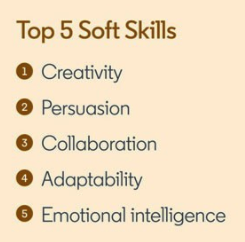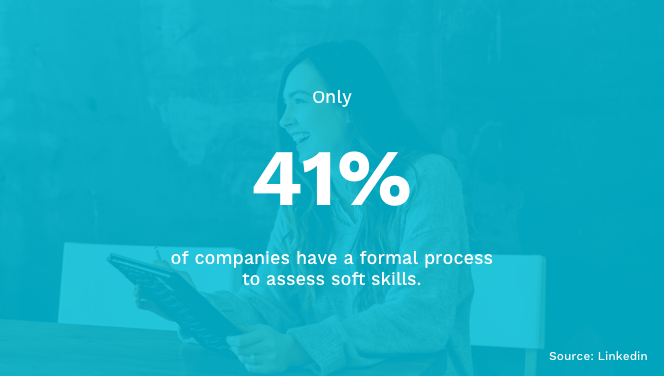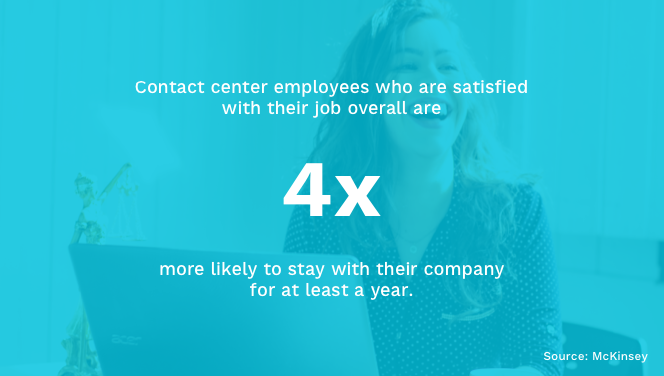Contact centers are the first line of defense when a customer has a problem or question, or when they want to buy a product. In order to be successful in their roles, they require some specific soft skills.
Soft skills, like problem-solving and communication, make it easier for employees to connect with (potential) clients and better serve them––but can also help employees stay engaged with their work. When they’re able to use the skills they have naturally to complete tasks they’re good at, they’ll feel more satisfied with the work they’re doing.
This means you need to hire contact center employees who already possess the soft skills you need on your team––but how can you go about measuring and assessing the skills of potential contact center agents?
Let’s explore!
What’s in?
Like what you see?
Don’t miss out. Subscribe to our monthly digest to get the latest TA and TM resources delivered right to your inbox.
1. Look at your top performers
Top performers of every team can tell you a lot about what works in that department and what doesn’t. Finding the soft skills needed for your contact centers isn’t any different.
Before you do anything, take a look at your best contact center employees. What makes them so good at their job?
It might be that they’re great at talking to people, or that they’re patient and can always get to the root of an issue without frustrating the client. They might also be great at solving problems, making them a valuable asset to anyone who needs help. Or they might have great negotiation skills that help close deals with the customers.
Observe these top employees to determine what they do differently than other team members. An alternative would be to hold interviews with each to talk through their processes, how they approach their role, and what skills they believe are the most important to the job.
2. Determine the soft skills needed for the role
After you’ve had an opportunity to talk with top performers and those close to the role you’re trying to fill, make a list of the soft skills you want new hires to possess. It’s useful to complete a job tasks analysis or an assessment that helps you identify the larger work responsibilities for a specific role.
Remember that all contact center positions aren’t the same. You’ll likely need to identify different soft skills for your different roles.
Here’s an example.
Let’s say your contact center has sales agents, service agents, and debt management agents. While they’re all work within the contact center, they all have different responsibilities and tasks, so different soft skills would be more beneficial in some roles than others.
Sales agents, for example, need to be confident and have the ability to sell your products or services. This usually means they need to have listening skills to understand what challenges the client is facing, and they need to be persuasive to convince the prospect to buy.
Service agents, on the other hand, probably will also need strong listening skills, but they also need to be empathetic and good at solving problems. They need to be able to relate to the client and work with them to solve whatever issue they’re facing.
Debt management agents might not need as much confidence as a sales agent, but they would need to be good negotiators.
Make unique lists of the skills you need to look for in each role you want to hire for. Once you know what to keep your eye out for, you can determine how to assess it.

According to a research by Linkedin, these soft skills are in high demand on the labor market.
Hire better live chat agents, at scale.
Dive into the rise of live chat, the skills of top-performing agents, and how to best assess them to reduce attrition and guarantee top-notch customer service.

3. Use assessments
Interviews can be challenging at assessing soft skills because everyone has their best foot forward. Someone who might not have strong communication skills naturally will be on their best behavior, so it might seem like they’re chattier or friendlier than they actually are.
Without the right assessments, you might find out that they’re not the right person for the role only when it is too late.
Using assessments throughout the interview process can help you get to know your candidates better, and allow you to measure soft skills in a scientific way.
Let’s look at an example.
Say planning and organization is a critical soft skill for the contact center role you’re hiring for. A candidate has planning skills listed on their resume, but they don’t have any direct experience that proves they possess this skill.
Rather than taking them for their word and hoping for the best, you can use a cognitive ability assessment and personality questionnaire to scientifically measure how they might plan their day, how they can prioritize their tasks and keep their workload organized.
These assessments might also show you that your candidate is adaptable and has critical thinking skills––other important soft skills for contact center roles.
You can also use situational judgement testing to gauge your candidates’ behavior and soft skills, and, at the same time, give them a virtual preview of a day in life of a contact center agent.
Including appropriate assessments in your interview process helps you shortlist candidates who actually have the skills you need instead of wasting time on candidates who just say they do.
Experience our best-in-class Live Chat Assessment first-hand!
Perfect for remote hiring, our live chat assessment makes it easier than ever to hire live chat agents. Candidates experience the job, while you get actionable data to drive hiring decisions.
4. Role-play
While assessments are one way to measure soft skills in a potential new hire, role-playing is a great way to see those skills in action.
With roleplaying, you’d have candidates act out different scenarios and respond in a way they think is appropriate. For example, if you’re hiring for a service contact center agent, you might role-play as a customer calling in for assistance.
Throughout the exercise, you can see how the candidate responds in different situations. You can assess how they use their soft skills to work with clients or even team members to determine if they really fit the responsibilities of the role.
5. Prepare the right interview questions
Role-playing and assessments both have their place in finding the right candidate for an open position, but it it still useful to follow these employee selection methods with a traditional interview is all you need.
However, to properly assess soft skills during an interview, you need to know what questions to ask.
The best way to discover soft skills in candidates you’re interviewing is to ask them to tell you stories. For example, if you’re looking for someone with strong communication skills, you might ask them to tell you about a time they and a co-worker had a miscommunication and how they resolved it.
You can ask similar questions for different soft skills, such as a time they had to learn something new to evaluate their curiosity or how they solved a problem they had never faced before to assess their problem analysis and solving skills.
Pay close attention to the responses they give. Ask for their specific role in solving the challenge––not just what the team did as a whole.

Having a structured process to assess soft skills helps you streamline your recruitment efforts, make consistent hiring decisions, and ensure fair hiring practices.
6. Gauge non-verbal and verbal cues
Sitting down face-to-face (or in most cases these days, over a video call) can actually give you a lot of insight into how a candidate would behave on the job. Through monitoring their non-verbal and verbal cues, you can get an idea of the soft skills they possess.
Listen to what your candidate says during interviews, but also the way they respond or how they give their answers. You might notice that they’re confident in what they’re saying, or they might seem unsure of their responses. You might also pick up on their listening skills in how they answer questions.
If you’re hiring contact center employees, you’ll also want to pay attention to things like their tone or how they come across in their responses. Are they quick to jump in and help, or does it take them a bit of time to find a conclusion or offer support? These things will be important in a customer-facing role.
7. Involve the team
Contact center agents often need to depend on one another to pick up slack or jump in when an issue is beyond their experience. This means they need to act as a team and it’s important each individual fits within that group.
As with any other department, getting involvement and input from the rest of the team can help you find the right employee for your role.
Because your team knows the day-to-day activities of the job better than anyone else, they can help assess your candidate’s soft skills. They can share who they believe is the best person for their role based on their experience with the position.
However, if you’re going to introduce team members to the interview process, make sure they’re properly trained. An interview is still a two-way decision process and you don’t want to scare a strong candidate away because of inappropriate questions or behavior from a team member during an interview.
Talk to them about what they can say, what they shouldn’t ask, and what they should look out for when peer interviewing a candidate. They should also be trained to watch out for common hiring biases.

Even when you’re video interviewing, you can still involve your team and let them meet your candidates. Many candidates also appreciate that.
8. Check references
References have hands-on experience working with your candidate, so there is no one better to ask about their soft skills. When you talk to a candidate’s references, probe about the skills they possess and how they handle different situations.
Here are some questions you can ask for different soft skills:
- Problem Solving: Does the candidate know when to escalate a problem?
- Leadership: How effectively does the candidate work with teams? How do they dictate responsibilities?
- Communication: Can the candidate clearly communicate information and ideas in a way that is easy for others to understand?
- Interpersonal skills: Does the candidate listen to others and ask questions when they need more information?
Just like when interviewing the candidate, pay close attention to how the reference responds. If they can’t provide detailed examples, the candidate may not be strong in that area.
9. Watch out for bias
Bias has a way to creep up even when we’re trying to avoid it. Because soft skills can be difficult to measure, bias can find its way into the hiring process.
In order to eliminate bias from your hiring process, you first need to educate yourself and your team on different hiring biases. Once you’re aware of what kinds of biases exist, you can implement new strategies to remove it from your process.
Consistently review your processes for adverse impact throughout the recruitment funnel. If you find that bias might have made its way into a hiring process, assess how that might have happened and what you can do differently the next time. That way, you can maintain fair hiring practices at your contact center.

Ensuring fair hiring practices and matching the right people to the right jobs is the first step to building and retaining an engaged workforce.
Over to you
According to 92% of talent professionals, soft skills matter just as much or even more than hard skills. This is particularly true in customer-facing roles, like those in contact centers.
When you design your process to assess candidates for both hard and soft skills, and organizational fit, you can be sure you’re selecting the best candidates for your open roles.
- White paper
Before you continue!
Don’t forget to grab your free copy of our new whitepaper on the digital transformation of contact center recruitment processes. Learn about:
- The biggest challenges in contact center recruitment today and how to overcome them.
- The 4 pillars of Digital Transformation
A top BPO’s journey towards a digitally transformed recruitment procest


